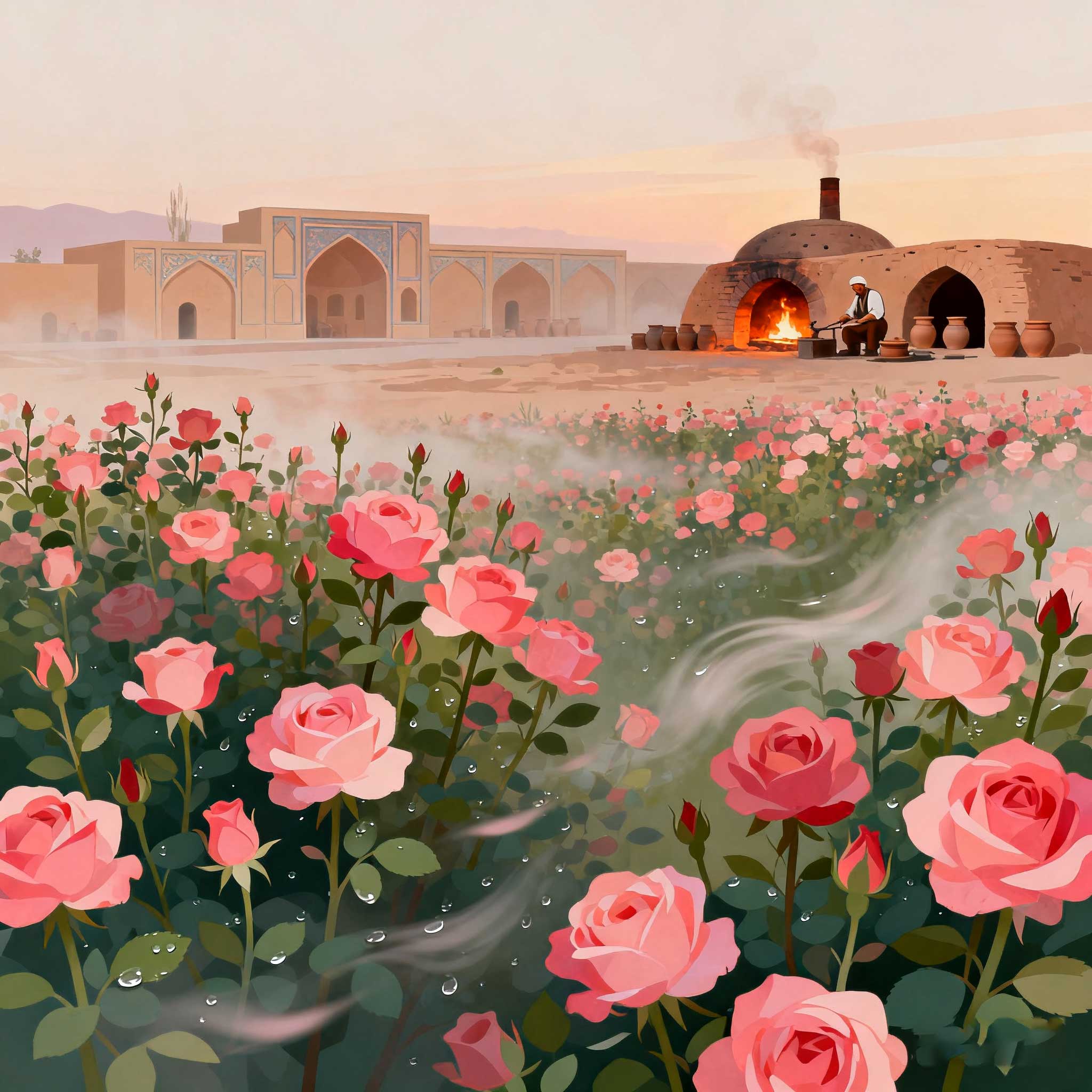+86-13516938893
Menu
global purchase

In the days when the Kashan Oasis of Iran had not yet been disturbed by hordes of travelers, its roses bloomed sweeter than honey. When the wind swept through the flowerbeds, it carried three kinds of scents—the fragrance of morning dew, the scent of midday sunshine, and the earthy aroma of clay from Old Potter Hassan’s kiln at dusk.
Hassan was the finest potter in the oasis. His hands could knead ordinary red clay into a texture as smooth as silk, and the kiln fire seemed to him like a speaking spirit, always helping him fire pottery bowls that were both sturdy and translucent. Yet Hassan had a worry: his young granddaughter Layla had been weak since childhood, even the gentlest spring breeze in Kashan could make her cough for days on end. Every day, the old potter would place a bowl of fresh rose honey water by the kiln, hoping the fragrance of roses would protect Layla.
One day, the oasis was struck by a once-in-a-century drought. The riverbed cracked open like the wrinkles on an old man’s face; rose petals curled up and turned brown one by one; even the most drought-tolerant date palms began to shed their leaves. Layla’s cough grew worse, and her lips dried up like sun-cracked clay. Hassan carried his water jug and searched the entire oasis, only to scoop up a small half-jug of murky water from a nearly dried-up old well. He sat by the kiln, clutching the jug, and watched the cold kiln fire—tears dripping onto the red clay beneath his feet.
Just then, an extremely clear and soft fragrance wafted into the kiln cave. It was not the scent of roses, nor of clay, but rather like the smell of moonlight falling on a spring. Hassan looked up and saw a woman standing at the kiln entrance, dressed in a pale green silk dress. A glistening white rose was tucked in her hair, and wherever her skirt brushed the ground, tiny buds sprouted from the cracked red earth.
“I am the guardian spirit of the Kashan Oasis,” the woman said, her voice like the wind blowing through a flute. “You have guarded the pottery craft of this land, and you have guarded your family. This devotion has kept the roots of the oasis from withering. But to save the oasis, you must give up your most precious possession.”
Hassan did not hesitate. “As long as Layla gets better and the oasis regains its vitality, I am willing to give anything.”
The woman pointed to the unfired clay 坯 Hassan cherished most—it was a birthday bowl he had been preparing for Layla, already carved with layers of rose patterns. “Turn this into a pottery bowl. Knead the clay with your tears and the last half-jug of well water, then grind the oldest brick from your kiln into powder and mix it in. When firing the kiln, you must keep singing the rose ballad your mother taught you when you were a child—never stop.”
Hassan set to work at once. His tears fell into the red clay, mixing with the well water and kiln brick powder; gradually, the clay 坯 took on a warm, moist luster. As he fired the kiln, he sang the ancient ballad his mother had taught him:“Roses bloom in Kashan’s embrace,Spring water rests in the pottery bowl’s heart,Kind souls, oh, the oasis will hold in its dreams…”
The kiln fire changed from pale blue to orange-red, then to warm gold. For three whole days and nights, Hassan’s voice grew hoarse, but he never missed a single note.
On the morning of the fourth day, when the kiln door was opened, a soft glow drifted out from inside. There, lying quietly at the bottom of the kiln, was the rose pottery bowl. The rose patterns on its surface looked as if they were alive, dotted with glistening “dew drops”—actually glaze droplets formed by the kiln fire, yet more translucent than real dew. What was even more magical was that the bowl held half a bowl of clear water, with a fresh white rose floating on its surface. Its fragrance spread across the entire oasis in an instant.
Hassan fed the water from the bowl to Layla. Her cough stopped immediately, and a rose-like flush appeared on her cheeks. He then poured the water into the old well—at once, clear, sweet well water gushed forth. When he poured it onto the parched earth, rose bushes bloomed again, and date palms sprouted new leaves. The oasis regained its vitality, even more lush than before. From then on, the roses of Kashan carried not just three scents, but a fourth—the “gentle fragrance of the pottery bowl.”
Later, Hassan taught the craft of making the rose pottery bowl to the young people of the oasis. But only those with kind hearts, who truly loved this land, could fire bowls adorned with “dew drops.” People said this was the guardian spirit’s quiet response—and also Hassan’s love, forever lingering in the wind of Kashan, in its flowers, and in every warm pottery bowl.